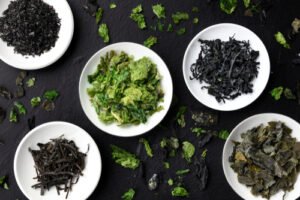Vegan Globetrotter is supported by our audience. When you purchase through one of our links, we may earn a small affiliate commission. As an Amazon Associate I earn from qualifying purchases. Your cost is not affected.
==================
Health Benefits of Sea Vegetables
In talks of health and diet, sea vegetables have always been an underrated subject of discussion. Among the many health benefits of sea vegetables include their antioxidant properties and a wide range of minerals found in the ocean. This article explains why you need to start eating seaweeds and their many varieties and incorporating them into your diet.
Sea vegetables, contrary to what a lot of people believe, do not classify as plants. They do not have roots, but have the ability to directly ingest minerals, nutrients, and water. But neither are they of the animal kingdom. Rather than sea plants, science classifies sea vegetables as edible marine algae.

The Best Types of Sea Vegetables
Most of the edible sea vegetables come from expansive species of seaweeds. However, single-celled algae, such as chlorella, also classify as sea vegetables. Experts classify seaweeds according to their color, which is green, red, and brown. While seemingly trivial as they grow just anywhere, the generous health benefits of sea vegetables prove quite remarkable.
We find an array of selections when it comes to choosing suitable sea vegetables to enjoy. The most widely known variety, the red algae or nori, often appears as a garnish for various dishes. Let’s look at some of the best types of sea vegetables and their health benefits.
1. Kelp
Kelp, also known as Giant Kelp, appears among the most commonly used edible sea vegetables. Its flexibility allows us to use it as a supplement, as a cooking ingredient, and can also be eaten raw or cooked. Food manufacturers like to use kelp as a food thickener due to the sodium alginate it produces.
Kelp belongs to the family of seaweeds, which have approximately thirty varieties. It grows large and brown in appearance. Kelp is usually found in coastal front areas, planted in shallow and nutrient-abundant seawater.
Because of this, eating kelp can be good for your body as it offers a range of health benefits. Kelp contains nutrients such as vitamin K1, vitamin A, vitamin B-12, folate, magnesium, pantothenic acid, calcium, and iron. It is also typically sold as powdered supplements because of the proven health benefits it brings to humans.
In addition, seaweeds are generally a great source of iodine, according to the National Institutes of Health. Our body needs iodine to produce thyroid hormones, which control the body’s many functions like metabolism. During pregnancy or infancy, thyroid hormones are responsible for bone and brain development.
2. Dulse
Dulse is typically known as red seaweed, a sea vegetable that grows along the Northwest Pacific and North Atlantic oceans. Unlike kelp, which can be eaten raw, dulse needs immediately drying in the sun once harvested. Most sells as a powder. Dulse proves quite versatile. In fact, it appears in household products such as snacks, food ingredients, and medicinal supplements. Yes, some Dulse finds use as a body scrub, too.
Dulse offers many health benefits, which is why eating it should become a habit for all. This sea vegetable often helps improve eyesight and prevents the development of cataracts, thanks to its vitamin A content. It also contains potassium, which provides excellent help in lowering blood pressure and, consequently, reducing the risk of heart diseases.
The Wonders of Dulse
In addition, dulse does great wonders to the systems of the body. For instance, it improves digestion as it contains dietary fibers that regulate the body’s digestive processes. Dulse benefits the nervous system (due to high levels of omega-3), the immune system (vitamin C), and blood circulation (iron).
Other nutritious contents of dulse include protein, calcium, zinc, beta-carotene, magnesium, vitamin B6, vitamin B12, vitamin E, iodine, and chlorophyll. There is a lot of ongoing research about other health benefits that the sea vegetable, dulse, may have. While we have yet to discover them, right now, we know why we should start eating seaweeds like dulse.
3. Wakame
Another type of seaweed is called wakame, a green sea vegetable farmed in many regions of Japan and South Korea. The health benefits of wakame are endless as it contains calories, carbs, protein, iodine, sodium, calcium, magnesium, folate, and manganese. This type of seaweed is rich in vitamin A, vitamin C, vitamin E, vitamin K, iron, phosphorus, and copper.
Studies show that eating wakame seaweed helps to protect the body from heart diseases and blood pressure. Animal research showed that there was cholesterol reduction upon consumption of wakame. Limited studies suggest that eating wakame aids in lowering blood pressure and managing cholesterol and blood pressure.
Helps prevent Cancer
Another health benefit of eating wakame is its anti-cancer properties. Animal studies discovered that wakame subdues the development and spread of breast, kidney, and colon cancer cells. However, uncontrolled consumption of wakame may increase the risk of thyroid cancer as excessive iodine results in surplus thyroid hormones.
This sea vegetable might help balance blood sugar and enhance resistance to insulin, as few studies suggest. Research showed that people who incorporated wakame with rice exhibited a better blood sugar response than those who ate rice alone. Another research study with mice also confirmed this, revealing that wakame improves insulin resistance in the body.
4. Chlorella
A fresh water-growing alga, chlorella, is becoming more and more popular these days due to its abundant health benefits. Because of its rigid cell wall, the human body’s digestive system cannot process chlorella in its natural form. Hence, chlorella is taken as a health supplement in liquid extracts or tablets rather than as food.
This sea vegetable contains various nutrients such as vitamin B12, vitamin C, protein, iron, antioxidants, omega-3s, and fiber. Chlorella also contains small amounts of magnesium, zinc, copper, potassium, folic acid, vitamin B1, B3, B8, and calcium. The nutritional properties of chlorella provide excellent health benefits like blood pressure regulation, blood sugar level maintenance, improved digestion, etc.
Natural Detox
A health benefit of this sea vegetable comes from its ability to act as a detoxifier for the body. In fact, it absorbs heavy metals, which supports body detoxification. The body needs some metals in tiny amounts. However, higher concentrations and some heavy metals prove hazardous.
Furthermore, chlorella helps support eye health, liver health, respiratory health, and the immune system. It also relieves some symptoms of premenstrual syndrome. Currently, scientific studies continue of these health benefits to support these claims. However, in theory, the nutrients contained in chlorella seem to provide these health benefits.
5. Kombu
Commonly utilized in East Asian culture, kombu is another type of sea vegetable that is part of species of seaweeds. In fact, Kombu actually belongs to the Kelp family, though not giant kelp. This sea vegetable provides health benefits and long life, according to those who enjoy it. While lacking official studies, most believe that the properties contained in kombu truly support health. This sea vegetable often appears in soups, stocks, and salads. Some fertilizers also contain Kombu for plant growth.
Kombu proves rich in nutrients, just like other sea vegetables or seaweeds. This sea vegetable contains calories, potassium, sodium, dietary fiber, carbohydrates, protein, and calcium. Kombu can also be used as a source of vitamin A, B-vitamin, vitamin C, vitamin E¸ vitamin K, iron, iodine, copper, and manganese. Kombu is a nutrition powerhouse filled with antioxidants that boost immunity, thanks to its unique combination of vitamins and minerals.
Some studies have revealed that kombu is excellent in decreasing the risk for cardiovascular diseases and other health benefits. Kombu can also be used in improving arthritis and boosting protection against diabetes. While these claims have but minor studies to support them, it is certain that eating seaweeds and adding them to your regular diet generally improves health and nutrition.
6. Nori
Because of the many health benefits of this sea vegetable, nori is considered a superfood. It is famously used to hold a sushi roll together. Just like kombu, nori is linked to health and longevity by Asian cultures.
Nori is very commonly known for its nutrients that support blood health. This sea vegetable is packed with iron, magnesium, copper, calcium, manganese, phosphorus, potassium, zinc, and selenium, to name a few. To make it even better, nori also contains protein, dietary fiber, thiamin, riboflavin, and vitamins A, C, E, and K.
One of the more remarkable health benefits of eating nori is its ability to reduce the risks of heart disease. Since nori contains carbohydrates, it prevents internal blood clotting that causes heart diseases. This sea vegetable is proven to lower cholesterol and blood pressure, though more studies are needed to strengthen the claim.
At risk for type-2 diabetes? Consider adding seaweed to your diet. Enjoy the flavors and reap the benefits of its ability to help in blood sugar management. Compounds like alginate and fucoxanthin do wonders in lowering blood sugar levels, therefore decreasing the risk of diabetes.
Finding these products to reap the health benefits of sea vegetables
Most stores now sell some form of sea vegetables. Often, specialty groceries such as Asian markets, offer a wide variety. However, I usually buy mine online as a convenience. I included links by each type to the actual products I keep on hand.
Need some recipes for cooking with sea vegetables?
First, consider adding them to rice, soups, and stews. Yes, a little sprinkling here and there makes a difference. For starters, make a Veggie Sushi Bowl for lunch or dinner. In fact, you might modify the ingredients to enjoy this several times a week! Or, make it a soup night with our Japanese Udon Noodle Soup Recipe.
Conclusion
These are only some of the wide variety of sea vegetables that can be found in the market. It is never too late to incorporate sea vegetables into your diet. Sea vegetables offer great nutrition. Their versatility enables us to use them in food, drinks, or as a snack. Moreover, they come in a variety of forms like dried, powdered, liquid, etc.
Whatever you choose, make sure to eat seaweeds in moderation. Excessive consumption of these sea vegetables has some side effects. Some of the common effects of overconsumption of seaweeds include overproduction of thyroid, exposure to heavy metals, and digestive issues.
Read More:
Healthiest Way to Cook Vegetables
Best Foods to Reduce Inflammation
What are Sea Vegetables? (Pacific Harvest)




Don't miss out
when new recipes and information are added!
Join our newsletter for free recipes,
healthy living inspiration, and special offers
You have Successfully Subscribed!